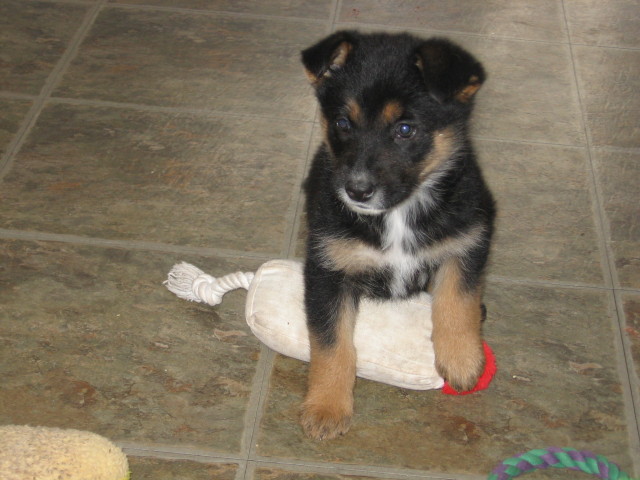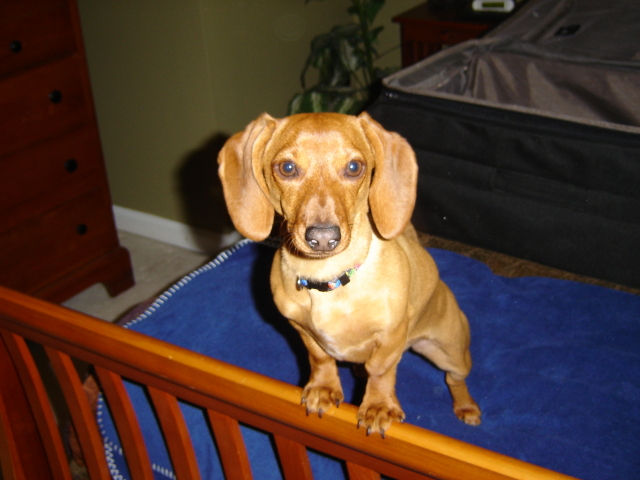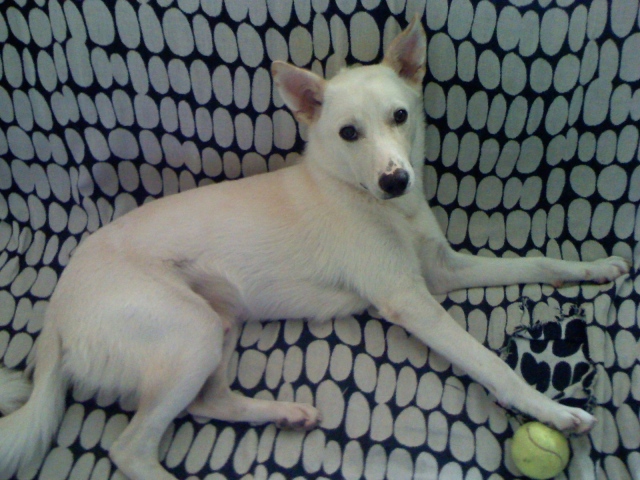Question
 home is a weewee pad,
home is a weewee pad,
vet said to use pads or litterbox, not outside unless summer(Minnesota)her area is the bathroom, pad on one side, food-water-bed on other, with puppy gate; (she chewed through!).She is confined unless under supervision, doesn't seem to matter! Had her since 3-4 mos. half the time she will pee-poo in front of pad while confined and not on pad. She gets goodgirl treats when she actually goes on pad.
any time she is out of ba, she will immed. run past ba to dnstairs and pee-poo on carpet! Several carpet cleanings inc enzyme cleansers. Have tried shaming, spanks (ex gentle of course), using loud firm disaproving voice. Have even tried mustard on toungue with kennel punishment to get away from physical discipline. I paid top $$$ and i love her dearly! The sweetest little snugglebug lover! My husband is so disgusted he has not been able to keep bond W/her, now considers her a varment and it is breaking my heart!!!
Aside from that there is the poo eating habit, cat box)and even her own if dried and available)like from under the bed that i am unaware of! Please help me, I am desparate!
She is ruining my home, and anus breath is hard to love!!
please call me if you like, you can call collect!
I don't want to lose her!!!! I am desparate!!!
Sincerely, Miranda Rae 763-427-8121 911911!!!
God bless you!
AnswerIf you are putting mustard on this dog's tongue with any remote idea that she is associating it with behavior that occurred even ONE TENTH OF SECOND beforehand, you need to have your head examined.
The dog IS using the pads; she is eliminating close to them; this is generalization and it occurs with all dogs who are pad trained. This dog isn't "trained", you somehow expect her to be able (through TELEPATHY no doubt) to understand what the pads are for. The crate is NOT for punishment, it is (at best, and not for all dogs) a "den" of sorts that dogs use for COMFORT. Shaming the dog and hitting the dog do NOTHING except further convince the dog that you are not to be trusted. furthermore, she has NO IDEA why you are giving her treats UNLESS you give them ONE SECOND after she eliminates on the pad EVERY single time she uses it for at least one month. Carpeting has the same feel to a dog's feet as do the wee wee pads. Your dog is afraid to eliminate in front of you and she's afraid to leave her feces around (which is why she's eating it, most likely.) This dog, at 2.6 pounds, is a prime candidate for hypoglycemia. You should be making certain she is consuming a HIGH QUALITY food in sufficient quantities over the course of the day. Coprophagia can also be a sign of inadequate nutrition.
Put a harness on this dog and long, very lightweight leash. Keep her with you at all times so she cannot go anywhere to eliminate out of your sight. Do not allow her to have free run of the house. Do not confine her to the bathroom because she is inconvenient; this is a living being who needs the company of her human companions. TAKE HER TO THE PAD on a very regular basis; stand there for fifteen minutes, giving her every opportunity to eliminate, and praise/food treat every single time she uses it for elimination. If she attempts to eliminate in front of you while she is on long lead, interrupt her by making a loud sound (NOT in her direction and DO NOT SHOUT at her) and then bring her to the pad and wait to see if she completes her elimination. You're quite fortunate she's using the pad at all given its proximity to her bed and food. If her urination is a problem, buy extra small doggie diapers at any pet supply store. This prevents the dog from urinating at will by containing the urine close to the dog's body; most dogs quickly learn not to urinate while wearing the diaper.
Dogs eat cat poop; that's the way it is. if the litter box is in the bathroom, MOVE IT.
I suggest you ask your veterinarian whether or not this dog has a liver shunt. This is a life threatening condition common in Yorkies (and other breeds); she needs a full blood chemistry. Take a look at your own behavior. Posting questions on the internet is not the way to go. Try reading about dog behavior: start with patricia McConnell Ph.D. Learn how to teach and care for this dog and, if you can't, find a certified applied animal behaviorist in your area and be prepared to pay them.


 Nightmares?
Question
Beethoven
Hi Melissa, Ive had my very h
Nightmares?
Question
Beethoven
Hi Melissa, Ive had my very h
 Agressive 1 yr old mini goldendoodle
Question
our millie
My husband and I got our min
Agressive 1 yr old mini goldendoodle
Question
our millie
My husband and I got our min
 puppy problems
QuestionQUESTION: I am the proud owner of 2 german shep
puppy problems
QuestionQUESTION: I am the proud owner of 2 german shep
 Mini Daschund with anxiety issues
QuestionAbigayle
QUESTION: I have a 3 1/2 yr old
Mini Daschund with anxiety issues
QuestionAbigayle
QUESTION: I have a 3 1/2 yr old
 Dog walking problems
Question
Snickers
I have been trying to train my dog SN
Dog walking problems
Question
Snickers
I have been trying to train my dog SN